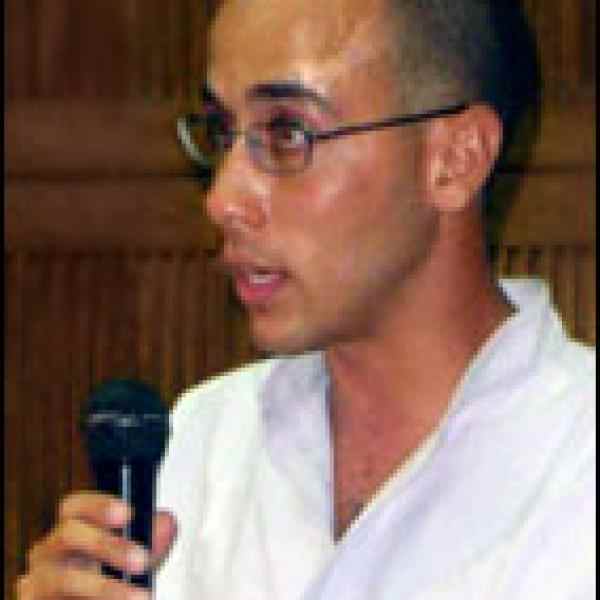Introduction
Ehaab Abdou is engaging Egypt’s very large number of educated young people in meaningful social work. He welcomes budding leaders into a dynamic network that nurtures their talents and encourages the creation of innovative development projects.
The New Idea
As a student, Ehaab Abdou kept starting things, and he saw very directly the enormous potential of young Egyptians. Today, when so many talented youth leave the country and/or feel there is no hope for positive change, the country loses exactly what it most needs for the struggle against poverty and disease. To stem this loss, Ehaab established Nahdet Masr, a network helping young social entrepreneurs generate and implement ideas for economic and social development.
Ehaab’s network, which now has members in eight countries, is a haven where young entrepreneurs can freely discuss even the most sensitive issues, creating and testing policy ideas without fear of censorship or recrimination. It connects young social leaders to its national and global networks of experts, as well as with funding opportunities to get new initiatives off the ground. Nahdet Masr also supports applied research on development areas, targeted specifically at issues affecting young people. Ehaab pushes his organization to mobilize Egyptians around the world, providing them with the professional training, mentorship, and resources they need to contribute to their country.
The Problem
In Egypt, many educated young people are completely alienated from mainstream life. These young intellectuals want to contribute positively to their country, but there are few outlets through which they can see their efforts making a difference. As a result, many of them fall prey to cynicism and despair. The few young Egyptians who remain firm and work to address social problems often find themselves without the guidance and financial support they need to move forward with their ideas. With few opportunities to test their ideas in their home country, many talented young people move elsewhere. The result is a massive brain drain that limits the success of development projects throughout Egypt.
The Strategy
To reverse this trend, and involve talented youth in needed development work, Ehaab founded Nahdet Masr. This organization brings native Egyptians and expatriates into a tight network to share ideas and design collaborative projects for development. It partners young social entrepreneurs with experienced professionals, tempering excitement and innovation with wisdom and stability. More than a dozen projects have already been initiated by its members, and many more are being planned. Ehaab and his team help secure financing for these initiatives through foreign donors, local businessmen, and aid organizations.
Three main programs support the primary work of Nahdet Masr. First, the Mentoring Program provides guidance and support to promising young Egyptians about how to maximize their personal growth and their contribution to Egypt’s future. Second, the National University Scholarship Project sponsors development projects by university students across Egypt. A third program aims to reverse the brain drain by encouraging Egyptian experts abroad to transfer knowledge to organizations in their home country.
Ehaab holds a vision of the future of Nahdet Masr that includes branches in every governorate and partnering with like-minded organizations to mobilize and empower youth throughout Egypt. Strong connections with universities will allow Nahdet Masr to identify and support a potentially unlimited supply of new leaders. Because Egypt has strong connections with both Arab and African countries, Nahdet Masr is well-positioned to spread their methods beyond the borders of Egypt.
The Person
Throughout his school years, Ehaab Abdou participated in social work activities, but it was during his time at the American University in Cairo that he began to work on projects of his own. He devoted his free time during college to the International League of Economics and Business Administration Students, the largest student league in the world. He was unanimously elected as the league’s first Egyptian president in 1995.
After graduation, Ehaab worked for some time in marketing, but he was haunted by the huge gap between his work promoting luxury goods and the needs of the majority of the Egyptian population. He soon decided to leave the food industry and work for a development organization. Here he was introduced to a wide array of social problems and gained experience in development work. However, Ehaab still did not feel that he was making enough impact, and he slowly began to craft a new idea.
In 1999, at age 27, Ehaab helped found Fat’het Kheir, the first Egyptian citizen group to offer interest-free microcredit to poor households. The organization helps families start sustainable income-generating projects: they have already helped more than five hundred families in Moqattam alone, an area of Cairo that was very badly hurt by the 1992 earthquake. As the first president of FK, Ehaab helped research and design the group’s microcredit model, and established close partnerships with citizen groups and donors to sustain its work for years to come.
In May 2004, Ehaab received his master’s in international development from the Graduate School of Public and International Affairs at the University of Pittsburgh. He currently dedicates time to the management of Nahdet Masr on a volunteer basis, running meetings and conferences, publicizing its projects, and seeking further partnerships and support.
